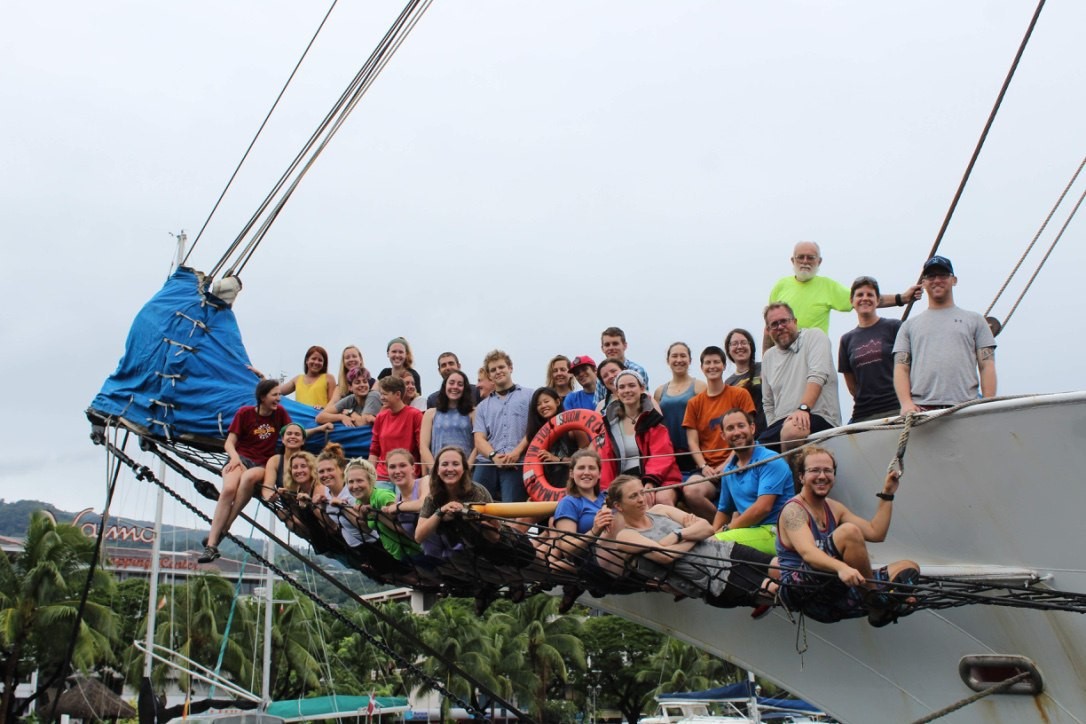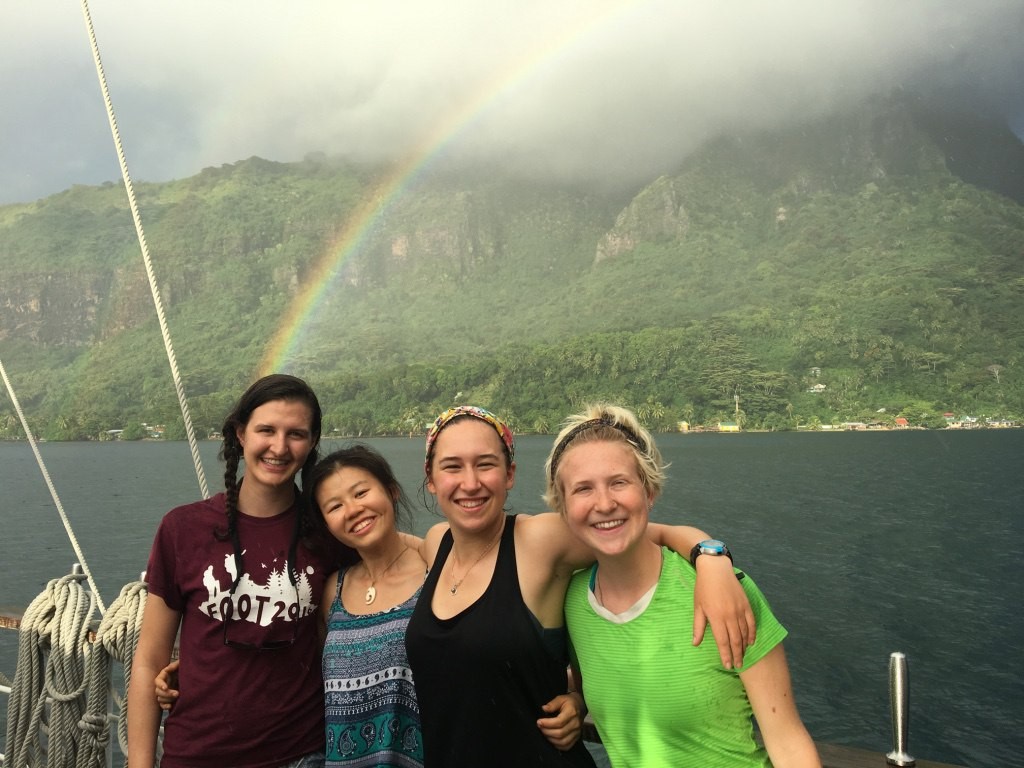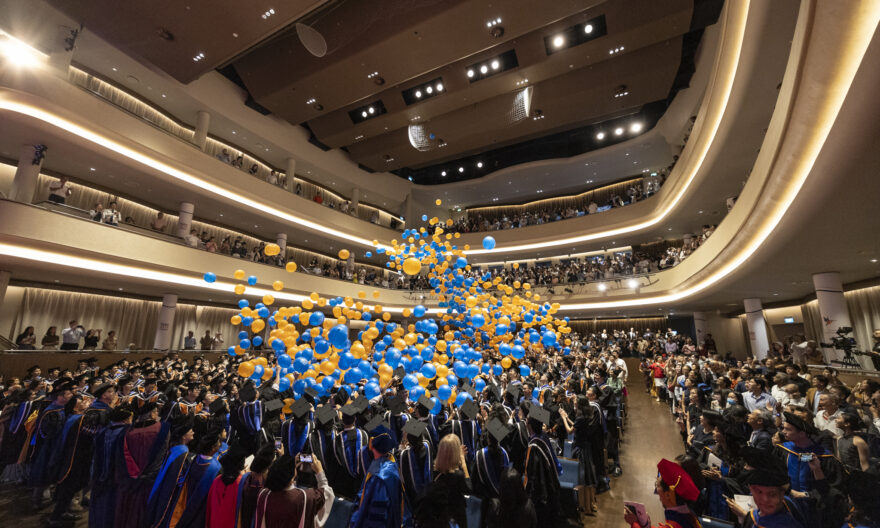Sail & study: First Yale-NUS student spends semester abroad at sea
 Image provided by Mike Weiss
Image provided by Mike Weiss
Rachel Tan (Class of 2019) is the first Yale-NUS student to pursue a full semester abroad out in the open sea through the SEA Semester offered by the Sea Education Association.
An Environmental Studies major, Rachel first spent six weeks taking classes at SEA Semester’s campus in Massachusetts, USA, before she set sail along with 21 other students on a voyage from New Zealand to Tahiti. The group sailed over 3,000 nautical miles over the course of six weeks.
The programme is titled “Oceans and Climate”, which offers students a chance to conduct baseline research to better understand the role of the ocean in climate dynamics and the global carbon cycle.
During the voyage, students also had the opportunity to study the unique marine ecosystems in the southwest Pacific Ocean.
“I knew I wanted to go on this programme immediately after visiting the programme website because my heart started beating really fast when I found out that it involved doing research out in the open sea for six weeks,” Rachel recalled.
“The prospect of doing real, rigorous oceanographic field work while being in the ocean itself was exhilarating, especially because I love the ocean and being out at sea.”
The opportunity to learn about nautical science also excited her.
“I thought it was incredible that I would be able to learn about nautical science and develop skills like sailing and sail-handling, celestial navigation, understanding weather, map-reading and all sorts of things that you’d need to know to sail a ship across the South Pacific,” she shared.
 Image provided by Rachel Tan
Image provided by Rachel Tan
Despite the new challenges that she faced during the programme, Rachel shared that her previous experiences abroad had prepared her well. She had spent both her freshman and sophomore summer abroad on summer internships offered by the Centre for International & Professional Experience (CIPE).
“In my freshman year, I went to Indonesia to work with an environmental NGO, and lived in a less-than-ideal environment for two months in a small city that had virtually no foreigners or English-speakers. I was forced to adapt and eventually picked up basic Bahasa Indonesia to be able to communicate with my coworkers,” she reflected.
In addition, she interned with Conservation International in Samoa during her sophomore summer.
“That experience of living on a small, tropical Pacific island nation that was surrounded by the most beautiful reefs and reef species was what made me certain that I wanted to go down the path of marine science or conservation in the future.”
“For both internship experiences, I went alone and had to navigate my way around entirely new living and working environments, and I felt that made me a more independent person. For that, I am extremely thankful to CIPE for offering students these opportunities.
One of her fondest memories from the programme was during the nights when she was on watch duty.
“Looking up at the dark sky and identifying stars and constellations with the full moon hanging low in the distance, it is nights like these that made me realise how I was part of a grand beautiful cosmos, and put many, many things into perspective,” she reflected.
“It’s hard to convey the magnitude of the emotions I felt while I was there because it’s not an experience many can empathise with.”
This semester abroad programme was an “academically formative experience” for Rachel.
“Personally, I believe that the best way of learning about the environment is to be in it. To be able to see with your own eyes the marine plants and creatures that exist out there in the remotest parts of the ocean makes you care for them in a way that is different from just discussing them in a classroom,” she shared.
These experiences during the voyage inspired her to pursue a research project that would involve working with some marine animals, especially from the tropical region.
“I decided to pursue a marine biology-related project on corals, and am now working with the NUS Reef Ecology Lab to do DNA sequencing of zooxanthellae (a type of algae) on a specific type of coral to identify the specific clades of zooxanthellae living on them as my capstone project,” Rachel explained.
The programme has also cemented her decision to pursue her interest in ocean studies further.
“I knew that I was interested in oceanography and marine science before I went on the programme, but experiencing it first-hand and meeting so many other people with the same passion for this field has cemented my decision to purse this path further, possibly through a Masters or PhD programme after my undergraduate education,” she added.





